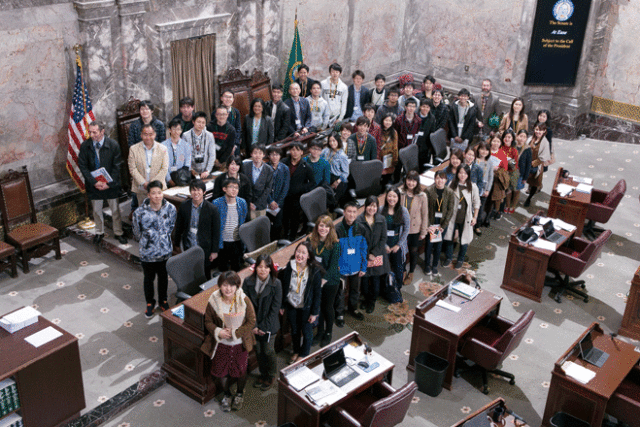
By Maiya Gessling
The North American Post
Washington State Senator Pramila Jayapal who, in part, represents the Beacon Hill and Central District neighborhoods of Seattle, traveled to Japan last December with the Kakehashi Project, an exchange program sponsored by the Japanese government.
NAP: What was the trip to Japan like?
Sen. Jayapal: “It was an incredible eight-day trip that I was able to take at the invitation of the ministry and the Japanese government. It was a real honor to be with nine other API leaders from across the country. It was just a very special opportunity to learn about the issues that are facing Japan today from foreign policy and territorial boundary issues, to aging and long-term care, to reconstruction after the earthquake and the tsunami and then we were able to get a wonderful slice of Japanese culture, food, language and art.”
What is the purpose of the Kakehashi Project?
“Under the umbrella of cultural exchange and under standing, the government is starting to invite other people–not students–but people who are highly placed in government, business and non-profit to go over.
There’s no return transfer project, unfortunately, with the U.S. government, but I think the goal is to affect public opinion and further education within influential parts of our society.”
Have you been to Japan before, or was this all new to you?
“I’ve never been to Japan but I’m very close to the Japanese American community here in Seattle because of my work with Hate Free Zone and OneAmerica.
A lot of the work post-9/11 happened with the support of Japanese Americans in our community who recognized that what we were doing post-9/11 was reminiscent of their experience with Japanese internment.
So we worked with the Japanese American Citizens League and a number of other organizations. I did some work with the Densho project when they expanded their interviews to people who had experienced post-9/11 civil liberties abuses.”
What did you learn about how Japan relates to the U.S. and Washington?
“In the Pacific Northwest we often think of the U.S.-Japan relationship in terms of trade; but there’s everything from Starbucks having the most stores in the world in Japan to all the products that we export—including things like pasta and potatoes that we don’t really think about.
Now that I’m running for the Seventh Congressional District, the U.S.’s role in protecting Japan post-World War II and these issues at the federal policy level are very important to think about.
The other piece that I really brought back with me is that there are a number of issues that countries around the world, including the United States, are dealing with. They’re particularly acute in Japan because of the smaller population and the dramatic rise in aging. The demographics are changing so dramatically and Japan is one of very few countries that has closed immigration.
There are some really important policy decisions that Japan is going to have to make in the next five to ten years about how it engages with immigration that will be consequential not only to the United States but to the rest of the world.”
What did you want to bring back to your own work as a senator and perhaps as a future congresswoman?
“I think that a lot of the territorial issues were quite new to me in terms of what the arguments are and I think it just brought me a clearer understanding of Japan’s position.
Also, I’ve been anti-war all of my life and I think that being able to speak from the very personal perspective of having gone to Japan and having read those stories at Hiroshima about what happened to people and what they went through— the tens of thousands of signatures from dignitaries who have visited Hiroshima and understand the cost of war—is going to be very important for me if I do get to congress.”
Anything that you’d like to add?
“I have a deep gratitude for the Japanese American community here that has been so welcoming of me and strongly supportive of the civil rights and immigrant rights issues that I’ve been fighting for. They’ve educated me about Japanese American culture here.”







